BALTOPS, KISS and connectivity
The ISPK (Institute for Security Policy at Kiel University)) hosted its 10th "Kiel International Seapower Symposium (KISS)", a one-day conference held during Kiel Week to discuss current issues on naval power, maritime security and its global challenges and to promote civil-military dialogue. The event aims to bring together experts from the military, academia and industry to discuss novel ideas and strengthen the exchange between different disciplines. The aim of the symposium is to provide a forum for the discussion of maritime issues and their impact on shipping, trade and politics. The event is aimed at hand-picked experts and is held under the "Chatham House Rule" to encourage open dialogue.
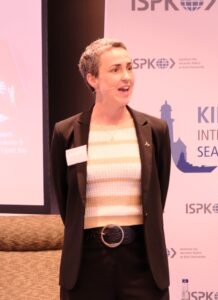
The Kiel International Seapower Symposium KISS, which is organised annually during Kiel Week, has established itself as Europe's leading forum for maritime security policy and maritime strategy since 2015. It is organised by the Institute for Security Policy at Kiel University (ISPK). Founded in 2009, the institute is considered one of the most renowned security policy research institutions in the German-speaking world with particular expertise in the areas of maritime security, strategic culture and international governance. With the Maritime Strategy & Security Department, headed by Johannes Petersthe ISPK has made a name for itself throughout Europe as a centre of expertise in marine strategy.
Cooperation partner for the second time is the German Institute for Defence and Strategic Studies (GIDS)The GIDS is a joint project of the Bundeswehr University Hamburg and the Bundeswehr Command and Staff College. The GIDS acts as a strategic think tank and aims to provide impetus for security policy decision-making processes through scientifically sound contributions. Within the framework of KISS, it contributes the Bundeswehr's security policy perspectives to the dialogue with civilian research institutions and international partners. KISS offers an exclusive, research- and practice-orientated framework for the promotion of maritime security policy and maritime strategy in Europe. It brings together members of the armed forces, academia, politics, industry and NGOs to discuss the future of naval power under Chatham House Rules. The symposium thus promotes the exchange of experience, innovation and networking.
In its 10th edition, KISS focussed on politics, strategy and imagination. Under the title "The Future of Seapower(s): Politics, Strategy & Imagination" KISS 25 shed light on the global situation - from conflicts in the Black and Red Seas to the Baltic Sea, politics, strategy and future visions of maritime power. Special attention is paid to the six "M's" of naval theory and practice:
- Men & Women (Personal)
- Money (financing)
- Manufacturing & Machinery (Equipment & Technology)
- Management (Leadership & Organisation)
- Mentality (Mindset)
- ...and most importantly: "mindset". Not as a repetition, but in the sense of the totality of technical culture, willingness to innovate and departure into the unknown - as the mindset that makes sea power fit for the future.
Press conference with maritime depth of field
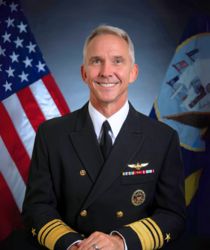
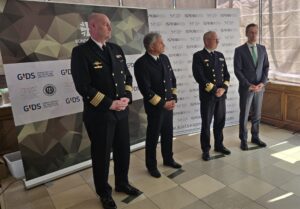
At a press conference organised by the ISPK as part of KISS 2025, Vice Admiral Frank Lenski, Deputy Inspector General of the Navy, and Johan Norlén, Chief of the Royal Swedish Navy, answered questions from the journalists present. Vice Admiral Jeffrey T. Anderson, Commander of the US 6th Fleet, was originally announced but was cancelled at short notice.
Both admirals emphasised the strategic relevance of BALTOPS in their opening statements and when answering in-depth questions. The multinational exercise not only makes it possible to train basic capabilities in a maritime network, but also offers the opportunity to work realistically with concrete operational plans. The leading role of the US Navy illustrates its sustained commitment to this operational area and to co-operation with European navies in the Baltic Sea region.
USA demonstrates solidarity
A concrete sign of this: While the "USS Paul Ignatius" was withdrawn early, the flagship "USS Mount Whitney" remained in the exercise area despite the tense global security situation - a strong signal of readiness to be present. For the Swedish naval commander Norlén, BALTOPS is in particular
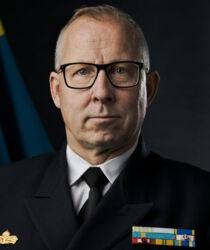
Chief of the Royal Swedish Navy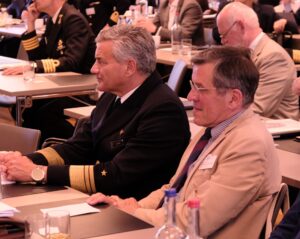
This is particularly important in view of Sweden's recent NATO membership. Just 15 months after officially joining, the exercise offers a platform for consolidating cohesion within the alliance. It is equally important for those NATO navies that are not permanently present in the Baltic Sea: BALTOPS gives them the necessary "situational awareness" for this increasingly sensitive area. But challenges also remain. Norlén openly named one of them: The exchange of maritime situational awareness is not yet guaranteed across the board. "Connectivity is a struggle," he said - connectivity is still a weak point.
The full-day conference, which was held in English, was divided into four panels: Panel I, entitled "Politics", looked at the recent and expected leadership changes in the alliance. What does the future of US power look like under the Trump administration, particularly in terms of its approach to Northern Europe? What to expect from the new federal government? What about alliances? Panel II was about "high level dialogue". Panel III was called Strategy and looked at existing and emerging new strategies How do allies and competitors reflect current and future challenges? Panel IV was called "Imagination". In a kind of retrospective, the question arose as to whether the events in the maritime sector over the last ten years were foreseeable for the experts. Did they imagine the future, which is now our present, in exactly the same way? Are there any plans for this and what are the prospects for the next ten years for naval strategists? What can we learn from history to make our societies more adaptable and resilient?
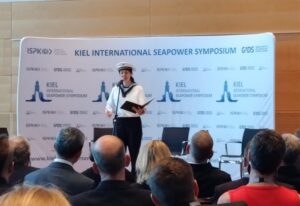

The evening reception at the House of the Schleswig-Holstein State Parliament did justice to the importance of the symposium. Dr Andre Pecher gave a detailed presentation on the hot topics in a panel discussion. The welcoming address was given by President of the State Parliament Kristina Herbst in the presence of the commander of the fleet, Vice Admiral Frank Lenski, who was present in his function for the last time.
The entertaining setting was a performance by Veronica Scholz, known as the "Poetry Matron". The former crew member of the frigate "Sachsen" and current reserve soldier performed her original word tricks and poems.
The surprise of the evening was KISS mastermind and spiritus rector himself: Dr Sebastian Bruns is leaving the ISPK. With an emotional voice, he announced his departure in September with a brief review and words of thanks. He will be setting off for "new shores" just a few minutes away by bike: the Ministry of the Interior of Schleswig-Holstein will be his new field of activity in maritime security. At first, the audience reacted with astonishment, then with prolonged applause.
Text: Hans-Uwe Mergener / Holger Schlüter
Photos: hum / hsc / ISPK

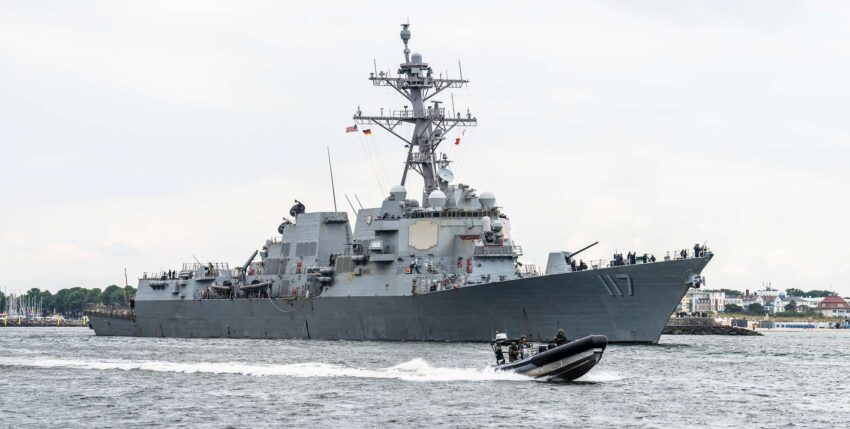






0 responses
On this occasion and at this point, all the best and good luck in your new position, Dr Bruns! Perhaps you are reading this 😉 H.S.